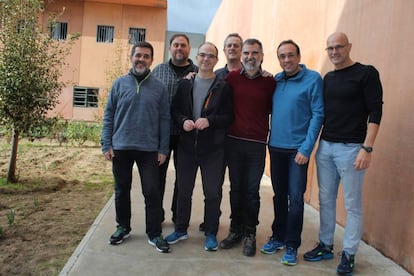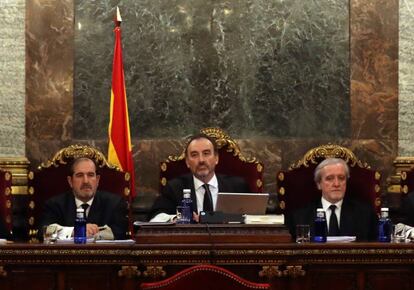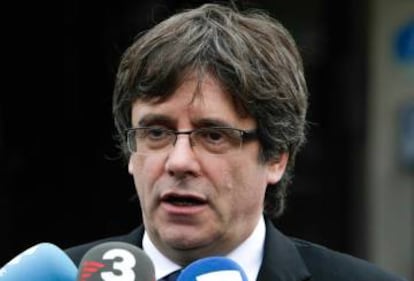Catalan independence leaders on hunger strike appeal to EU for help
In a letter to heads of state, the four separatists argue the Constitutional Court is “blocking” their attempts to seek justice in Europe

Four Catalan independence leaders who are on a hunger strike in prison awaiting trial for rebellion over their role in last year’s unauthorized referendum and subsequent unilateral declaration of independence have sent 40 letters to European Union authorities to denounce their situation.
In their message to the heads of European nations and EU officials, the four men detail how Spain’s Constitutional Court is, in their view, “blocking” all their appeals, in order to prevent them from getting their cases to the European justice system.
Our rights to the presumption of innocence and to a fair trial are being violated
Letter to EU leaders
Ex-Catalan government members Jordi Turull, Josep Rull and Joaquim Forn, as well as Jordi Sànchez, former head of the pro-independence civic organization ANC and currently a regional deputy, want to draw attention to their “dire situation,” said Pilar Calvo, their spokeswoman.
“There are nine of us and we have been in prison without trial for over a year, accused of rebellion for calling a peaceful referendum. Our rights to the presumption of innocence and to a fair trial are being violated,” says the letter, a copy of which has also been mailed to Spanish Prime Minister Pedro Sánchez.
The letters say that their appeals to the Constitutional Court should normally be ruled on in 30 days, but have instead been on hold for over a year. For this reason, the activists say they will appeal the delay itself before the European Court of Human Rights in Strasbourg.

Calvo described the hunger-striking men as “strong, firm and determined.” Only one of them, Turull, has required hospital treatment since the group began their protest around two weeks ago. All four have ties to Junts per Catalunya (Together for Catalonia), the political platform headed by former regional premier Carles Puigdemont, who currently lives in Belgium after fleeing Spain to avoid arrest on the same charges as the others.
The other jailed secessionist leaders – Oriol Junqueras, Raül Romeva, Carme Forcadell and Dolors Bassa of the Catalan Republican Left (ERC), as well as Jordi Cuixart, head of the civic group Omnium – have refused to join the hunger strike. The ERC deputy inside the Spanish Congress, Joan Tardà, called it “unnecessary.”
The trial
On Tuesday, the Spanish Supreme Court began preliminary proceedings by holding a hearing to determine whether it has the jurisdiction to try the accused. The defense claims that it does not, and that their clients should be tried instead by the High Court of Catalonia.
No date has been set yet for the trial itself, but sources familiar with the situation said that it is likely to begin in January. A total of 18 people are facing charges of rebellion, sedition, disobedience and misuse of public funds.
Road to prison
On October 1, 2017 a separatist government led by Carles Puigdemont organized an independence referendum in defiance of a court suspension on the grounds of its unconstitutionality. The vote was made possible by a law passed inside the Catalan parliament that did not achieve the two-thirds majority required by Catalonia’s regional charter, the Estatut.

The day of the referendum produced unprecedented scenes of violence as National Police and Civil Guard officers were sent in to stop the vote from taking place, while the regional police force was accused of standing by. Later that month, separatist parties made a unilateral declaration of independence based on the outcome of the vote, which, according to the Catalan government, received 90% support for independence. Spain revoked the region’s devolved powers and Puigdemont and several aides fled Spain to avoid rebellion charges, while other leaders who remained behind were arrested and placed in pre-trial detention.
Direct rule by Madrid ended shortly after Catalonia held a snap election in December 2017 that gave separatist parties 47.5% of the popular vote, although this translated into a slim majority of 70 seats due to a proportional representation system that favors rural dominance.
New leaders in Catalonia and in Madrid made initial overtures of friendship, but the relationship has become increasingly strained. Catalan premier Quim Torra recently defended “the Slovenian way” as a model for Catalan independence, alluding to a violent process that yielded dozens of casualties as the country split from Yugoslavia.
This coming Friday will newly test the relationship as PM Sánchez has decided to hold a Spanish Cabinet meeting in Barcelona that pro-independence groups are promising to boycott with extensive street protests. Thousands of police officers from national, regional and municipal agencies are being deployed to keep the peace in the Catalan capital and across the region.
English version by Susana Urra.
Tu suscripción se está usando en otro dispositivo
¿Quieres añadir otro usuario a tu suscripción?
Si continúas leyendo en este dispositivo, no se podrá leer en el otro.
FlechaTu suscripción se está usando en otro dispositivo y solo puedes acceder a EL PAÍS desde un dispositivo a la vez.
Si quieres compartir tu cuenta, cambia tu suscripción a la modalidad Premium, así podrás añadir otro usuario. Cada uno accederá con su propia cuenta de email, lo que os permitirá personalizar vuestra experiencia en EL PAÍS.
¿Tienes una suscripción de empresa? Accede aquí para contratar más cuentas.
En el caso de no saber quién está usando tu cuenta, te recomendamos cambiar tu contraseña aquí.
Si decides continuar compartiendo tu cuenta, este mensaje se mostrará en tu dispositivo y en el de la otra persona que está usando tu cuenta de forma indefinida, afectando a tu experiencia de lectura. Puedes consultar aquí los términos y condiciones de la suscripción digital.








































